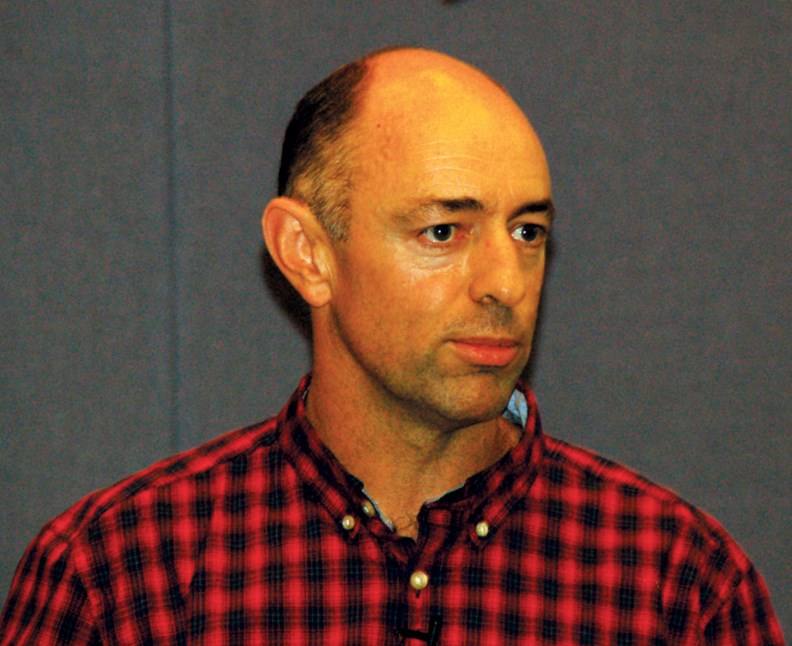The District of Sechelt is getting closer to crafting a water conservation plan after a second e-town hall meeting on the issue was held Sept. 29.
The first meeting, held in the midst of a drought and severe water restrictions, brought more than 100 concerned citizens out, while Tuesday’s meeting saw about a dozen residents show up and a handful more tune in online.
Sechelt Mayor Bruce Milne noted the first meeting focused more on securing additional water supplies as per the appetite of the audience.
“But we are moving along tonight on the conservation side of things to develop a plan. We really do need to determine how best the District of Sechelt, as an organization but also as a community, can conserve water as we move into the future,” Milne said.
Sechelt Water Resource centre project manager Paul Nash then took over the meeting to explain why Sechelt needs a water conservation plan. He highlighted the four main ways to reduce potable water use and went over feedback from the first meeting, before laying out some specific actions the district could move forward on.
Nash explained Sechelt’s conservation plan would ultimately detail ways to reduce potable water use in Sechelt and suggest ways to use the resource more wisely.
“The province says we have to have one. Our OCP says we have to have one. Our sustainability plan says we have to have a water conservation plan, and they’re actually useful things,” Nash said. “Why else do we need it? Because we ran out of water.”
Nash highlighted four main ways to reduce water use including conservation, efficiency (to use less water for the same purpose – through drip irrigation, for example), productivity (to increase production with the same amount of water – through the use of a greenhouse, for example) and using an alternative source of water.
On the alternate source of water, Nash suggested reclaimed water from the District’s wastewater treatment plant could be a viable irrigation option for major water users like Blue Ocean Golf Club.
Some audience members voiced concern around using that reclaimed water and Nash said there will be a specific meeting, scheduled for Oct. 20 at the wastewater facility, to deal with concerns and questions related to the wastewater treatment plant’s reclaimed water.
Other alternative sources of water suggested included drilling wells on properties, capturing rainwater and reusing storm water, groundwater and grey water.
District planner Angela Letman noted that while drilling a well may seem like a good idea, it can be very costly and may not ultimately produce enough water or safe water, as chemicals like arsenic can be found in wells on the Coast.
While many at the first e-town hall meeting wanted to see a rebate program of some kind for rain barrels or other systems, Milne said most homeowners would need six or seven of the barrels to keep gardens and landscaping alive during drought conditions.
He also said the Sunshine Coast Regional District (SCRD) ran a similar program that was not well received and he questioned if rebates were enough to motivate some people to collect rainwater.
One woman in the audience asked about the ability to take water directly from streams during drought conditions, but Letman said to do that, a licence from the province is needed.
The issue of water meters came up at the meeting and Nash said the district would definitely include water metering in the new conservation plan.
“That is happening. Our OCP has said for five years we will support that, and so we will,” Nash said, noting the SCRD is moving forward with its water metering plans for the entire Sunshine Coast, which is expected to help find leaks in the system.
Nash noted that some of the specific actions the district could move forward on in relation to water conservation included: compiling all relevant information for homeowners on water conservation and efficiency; creating a rainwater harvesting guide or water-wise gardening guide; looking for more ways to use storm water for streetscape plantings; and compiling all relevant information and rules around alternate water sources available for use in Sechelt.
The district still wants to hear from constituents about their ideas for the new water conservation plan and input will be taken on the subject until Oct. 5 by email at [email protected] or Twitter using the hash tag #H20Sechelt.
Residents can also view recordings of the e-town hall meetings and find more information at www.sechelt.ca/ContactUs/TownHallInput.aspx.



